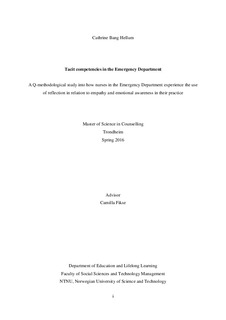| dc.description.abstract | Nursing is an education than can be put in to use in a myriad of different jobs and work arenas. This diversity also means that there are many different conditions, perspectives, preferences, cultures and dispositions for nurses’ practice. The purpose of this study is to better understand nurses in the emergency department and their relationship to some of the tacit competencies in their work. The research question is: How do nurses experience the use of reflection in relation to empathy and emotional awareness in their practice in the emergency department?
The study is based on Q-methodology and has 20 participants sorting 36 statements in relation to the three effects; reflection, empathy and emotional awareness. The participants are all nurses in an emergency department at a university hospital. The statements are sorted in an inverted pyramid pattern from agreeing (+5) to disagreeing (-5).
The participants’ sorting go through a factor analysis program resulting in three factors, which through interpretation are named; (F1) All about the patient, (F2) Independent, automated and with emotional distance, (F3) Reflecting in action and keeping on top of the affective. The factors are discussed in light of different learning theories, skills acquisition, empathy and self-awareness.
The study reveals that the nurses differ in the way they use reflection in their practice. Factor 1 seems to be novice nurses and use different reflective modes, while Factor 3 nurses fit the concept of expert nurses, using reflection during action and are highly intuitive in their approach. Factor 2 nurses stand out compared to Factor 1 and 3, as they are more focused on procedures and the automated actions, and have no distinct mode of reflection. Factor 2 nurses are more emotionally distanced and do not recognize colleagues as reflective partners, contrary to Factor 1 that emphasize relational closeness and Factor 3 that recognize the importance of emotional labour and adapting to the patient’s needs.
In conclusion, given the large differences in modes of reflection and strategies concerning emotional awareness and empathy, training and further education for the nurses in the ED would benefit from being more individualized and adapted to their particular needs. | nb_NO |
